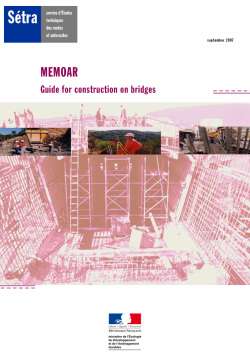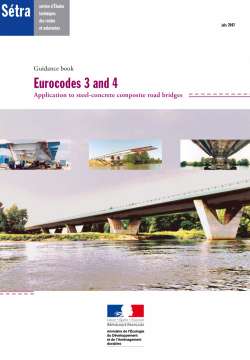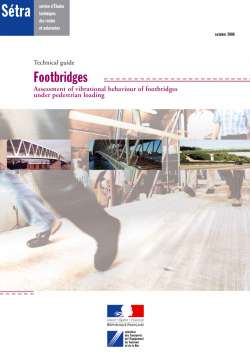
Prestressed concrete bridges bruilt using the cantilever method
This guide provides a highly detailed description of the design andconstruction of prestressed concrete bridges built by the cantilevermethod.
Highly informative and lavishly illustrated, each of the ten chapterscovers one of the stages in the development of these types ofstructures: preliminary design, detailed design, calculations,preparation of the invitation to tender, construction, monitoring ofworks, maintenance, etc.
This guide provides a highly detailed description of the design andconstruction of prestressed concrete bridges built by the cantilevermethod.
Highly informative and lavishly illustrated, each of the ten chapterscovers one of the stages in the development of these types ofstructures: preliminary design, detailed design, calculations,preparation of the invitation to tender, construction, monitoring ofworks, maintenance, etc.
Thanks to its comprehensive coverage of the subject, this guide willbe of interest to anyone involved in the design and construction ofbridges built by the cantilever method (project managers, consultingengineers or technicians, construction managers, works inspectors andarchitects) in addition to teachers specialising in civil engineering.
This technical guide is intended for engineers and architects involvedin designing, calculating and verifying concrete bridges built by thecantilever method.
Table of contents
AUTHORS1ACKNOWLEDGEMENTS4
TABLE OF CONTENTS5FOREWORD7
1 - BACKGROUND INFORMATION 8
1.1 - PREAMBLE8
1.2 - TECHNICAL PROCESS10
1.3 - FIELDS OF APPLICATION 11
1.4 - DEVELOPMENT OF THE CONSTRUCTION TECHNIQUE IN FRANCE 14
1.5 - MAJOR CIVIL ENGINEERING STRUCTURES RECENTLY CONSTRUCTED OUTSIDE OF FRANCE 19
2 - GENERAL DESIGN21
2.1 - FIELD OF APPLICATION 21
2.2 - STATIC LONGITUDINAL DESIGN 21
2.3 - CHOOSING A CROSS-SECTION 30
2.4 - PRE-DESIGN OF A SIMPLE CROSS-SECTION 34
2.5 - BREAKDOWN INTO SEGMENTS 39
2.6 - MAIN RATIOS41
3 - DESIGN AND VERIFICATION OF LONGITUDINAL CABLING 43
3.1 - CABLING PRINCIPLES43
3.2 - STRESS CALCULATIONS 52
3.3 - VERIFICATIONS TO BE CARRIED OUT WITH REGARD TO NORMAL STRESSES 54
4 - TRANSVERSE AND LOCALIZED BEHAVIOUR 58
4.1 - VERIFICATION PRINCIPLES 58
4.2 - TRANSVERSE FLEXION 59
4.3 - GENERAL TANGENTIAL STRESSES 70
4.4 - SPECIFIC ELEMENTS79
4.5 - LOCALIZED FORCES AND REINFORCEMENTS 81
4.6 - RULES TO COMBINE PASSIVE REINFORCEMENTS 85
4.7 - RECOMMENDED CONFIGURATIONS FOR REINFORCEMENTS 88
5 - CANTILEVER STABILITY 93
5.1 - PRINCIPLE OF CANTILEVER STABILITY 93
5.2 - STABILITY SYSTEMS FOR CANTILEVERS 94
5.3 - ACTIONS TO CONSIDERED 103
5.4 - COMBINATIONS OF ACTIONS DURING CONSTRUCTION 107
5.5 - VERIFICATION AND DIMENSIONING OF THE ANCHORING ELEMENTS 111
5.6 - VERIFICATIONS OF OTHER STABILIZATION METHODS 119
6 - CONSTRUCTION TECHNOLOGY 124
6.1 - CONSTRUCTION USING CAST-IN-SITU SEGMENTS 124
6.2 - CONSTRUCTION BY PREFABRICATED SEGMENTS 138
7 - ON SITE MONITORING 149
7.1 - BACKGROUND INFORMATION 149
7.2 - INSPECTION OF GEOMETRY 149
7.3 - INSPECTION OF TEMPORARY STRUCTURES 165
7.4 - INSPECTION OF CONCRETE 168
7.5 - INSPECTION OF FORMWORK 178
7.6 - INSPECTING THE REINFORCEMENTS 178
7.7 - INSPECTION OF PRESTRESSING 179
7.8 - OTHER IMPORTANT POINTS 190
8 - PATHOLOGIES AND REPAIRS 195
8.1 - HISTORY OF THE REGULATIONS 195
8.2 - PATHOLOGIES SPECIFIC TO THE CANTILEVER CONSTRUCTION TECHNIQUE 200
8.3 - MAIN REPAIR TECHNIQUES 2059 - PROVISIONS TO FACILITATE MAINTENANCE 208
9.1 - GENERAL PRINCIPLES 208
9.2 - BRIDGE DECK2089.3 - PIERS212
9.4 - ABUTMENTS216
10 - RECOMMENDATIONS FOR THE CREATION OF A CONTRACTOR TENDER DOCUMENT219
10.1 - NATURE OF THE TENDER ENQUIRY 219
10.2 - CREATION OF A CONTRACTOR TENDER DOCUMENT 219
10.3 - TENDER REGULATIONS 220
10.4 - TENDER DOCUMENT 221
10.5 - SPECIAL ADMINISTRATIVE CLAUSES 222
10.6 - SPECIAL TECHNICAL CLAUSES 224
10.7 - PRICE SCHEDULE229
A1 DETERMINATION EXAMPLE 230
A1.0 – PURPOSE OF THIS APPENDIX 230
A1.1 - REMINDERS230
A1.2 – SOURCE DATA235
A1.3 – CANTILEVER PRESTRESSING DESIGN 240
A1.4 – PRESTRESSING DESIGN FOR THE CLOSING SEGMENT 243
A1.5 – EXTERNAL PRESTRESSING DESIGN 252
A2 MONOGRAPHS OF CAST-IN-SITU BRIDGES 264
A3 BIBLIOGRAPHY291
A3-1 – OFFICIAL TEXTS291
A3-2 – SÉTRA GUIDES, SÉTRA-LCPC, SÉTRA-SNCF 291
A3-3 – OTHER PUBLICATIONS 291
A3-4 - ARTICLES IN MISCELLANEOUS PUBLICATIONS 291
AFPC/AFGC PUBLICATIONS FOR FIB (FÉDÉRATION DE L’INDUSTRIE DUBÉTON-CONCRETE INDUSTRY FEDERATION) CONGRESSES 291
REVUE TRAVAUX291SÉTRA BULLETIN OUVRAGES D’ART 291
BULLETIN DES LABORATOIRES DES PONTS ET CHAUSSÉES 291
ANNALES DE L’ITBTP291TECHNIQUES DE L’INGÉNIEUR 291
PCI JOURNAL291
REVUE L’INDUSTRIA ITALIANA DEL CEMENTO (IIC) 291










